In Focus: Mamma Mia! – The Movie
In July 2008 the star-studded film version of the Mamma Mia! musical opened in cinemas all over the world. In this feature we trace the background story of the movie, with exclusive comments from ABBA’s Benny Andersson and Björn Ulvaeus, as well as screen writer Catherine Johnson.
The turning-point
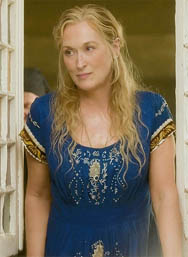 Unless you’ve been living under a rock for the past decade or so, it’s highly unlikely you’re not familiar with the global success story that is Mamma Mia! After opening in London, England on April 6, 1999, the musical – about a single mother, her daughter, and three possible dads invited by the daughter to her wedding – has become a success beyond all comprehension. Mamma Mia! has played in innumerable stagings all over the world, and has so far been seen by more than 30 million people.
Unless you’ve been living under a rock for the past decade or so, it’s highly unlikely you’re not familiar with the global success story that is Mamma Mia! After opening in London, England on April 6, 1999, the musical – about a single mother, her daughter, and three possible dads invited by the daughter to her wedding – has become a success beyond all comprehension. Mamma Mia! has played in innumerable stagings all over the world, and has so far been seen by more than 30 million people.
Although no one could have known exactly how successful the musical would become when it first opened, it didn’t take long before those involved began considering a movie version. “I knew early on that there would be a film sooner or later, although I don’t remember the exact turning-point”, says former ABBA member Björn Ulvaeus. Only a couple of years after the London opening, Mamma Mia! producer and mastermind Judy Craymer had a meeting in Los Angeles with eager agents and production companies. But at the time she felt it was too early: there was the concern that a movie version would “steal” attention from the various stage versions.
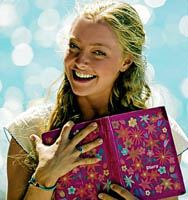 However, according to Björn Ulvaeus those fears had been overcome just a few years later. “It used to be that one wouldn’t make a film until ‘the stage musical has had its run’,” he explains, “but that rule has been abandoned these days. There doesn’t seem to be a particular timing that is exactly right, but there is plenty of evidence that the stage version benefits from a film version, no matter what kind of business the latter does. ‘Phantom Of The Opera’ is an example of that. It was about to close on Broadway when the film – which wasn’t a major success – opened, but it could continue after all the media exposure from the film.”
However, according to Björn Ulvaeus those fears had been overcome just a few years later. “It used to be that one wouldn’t make a film until ‘the stage musical has had its run’,” he explains, “but that rule has been abandoned these days. There doesn’t seem to be a particular timing that is exactly right, but there is plenty of evidence that the stage version benefits from a film version, no matter what kind of business the latter does. ‘Phantom Of The Opera’ is an example of that. It was about to close on Broadway when the film – which wasn’t a major success – opened, but it could continue after all the media exposure from the film.”
Relishing the challenge
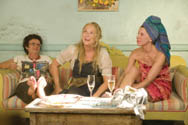 Nevertheless, it took until April 2006 – after much press speculation if and when there would ever be a movie version – before it was finally announced that the musical would indeed be filmed for the big screen. The production company responsible for bringing Mamma Mia! to the screen was Playtone, founded by Hollywood star Tom Hanks and producer Gary Goetzman. And although it was clear from the outset that Hanks himself would not star in the movie, many of the original production team from the stage version would be on board: for instance, original director Phyllida Lloyd would make her debut as film director – said Björn Ulvaeus about Lloyd, “If there’s anyone who knows this story, it’s her” – and Catherine Johnson, who wrote the so-called book (the musical manuscript), would write the screenplay.
Nevertheless, it took until April 2006 – after much press speculation if and when there would ever be a movie version – before it was finally announced that the musical would indeed be filmed for the big screen. The production company responsible for bringing Mamma Mia! to the screen was Playtone, founded by Hollywood star Tom Hanks and producer Gary Goetzman. And although it was clear from the outset that Hanks himself would not star in the movie, many of the original production team from the stage version would be on board: for instance, original director Phyllida Lloyd would make her debut as film director – said Björn Ulvaeus about Lloyd, “If there’s anyone who knows this story, it’s her” – and Catherine Johnson, who wrote the so-called book (the musical manuscript), would write the screenplay.
Johnson certainly never thought twice about grabbing this opportunity to transfer her story to the screen. “I relished the challenge!” she enthuses. “I love movies, I want to write movies, this was an unmissable opportunity for me – and of course I felt ‘no-one knows these characters like I do, it has to be me writing the screenplay’.” That said, Johnson certainly had to find a unique way of approaching the process of screen writing, balancing the appeal of the original stage show against the opportunities afforded by a cinematic context. “What took me some time to accept is that the show has a very solid structure”, she admits. “My early drafts of the screenplay tried to move away from that and everything became over-complicated. I was excited to be doing something different and trying to re-write every line, but as they say ‘if it ain’t broke …’”
“I am Mamma Mia!”
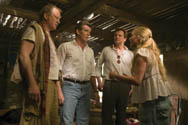 As Catherine Johnson got to grips with the screenplay, the production team began considering who might be the right actors for the film version. While it had always been the point of the stage version that the musical itself was the “star”, obviously for a movie you need top-drawer names to help pull in an audience. In January 2007 it was announced that none other than Meryl Streep – one of the most famous and well-respected American actresses of the past three decades – had signed on to play the lead role of Donna. Well before the movie version Streep had made it clear that she was a fan of the musical, sending her compliments to the cast after seeing a Broadway performance. Naturally, the production team took note. When Streep was asked whether she would like to appear in the movie version, her reply was more enthusiastic than the production team had dared hope for: “Are you kidding? I AM Mamma Mia!”
As Catherine Johnson got to grips with the screenplay, the production team began considering who might be the right actors for the film version. While it had always been the point of the stage version that the musical itself was the “star”, obviously for a movie you need top-drawer names to help pull in an audience. In January 2007 it was announced that none other than Meryl Streep – one of the most famous and well-respected American actresses of the past three decades – had signed on to play the lead role of Donna. Well before the movie version Streep had made it clear that she was a fan of the musical, sending her compliments to the cast after seeing a Broadway performance. Naturally, the production team took note. When Streep was asked whether she would like to appear in the movie version, her reply was more enthusiastic than the production team had dared hope for: “Are you kidding? I AM Mamma Mia!”
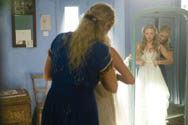 With Streep on board, there were no problems in attracting a stellar cast for all the main characters. It was soon announced that Pierce Brosnan, Colin Firth and Sweden’s own Stellan Skarsgård would play the three possible dads, while Julie Walters and Christine Baranski would take on the parts of Donna’s friends. Amanda Seyfried had landed the part as Sophie, Donna’s daughter, with Dominic Cooper cast as Sophie’s boyfriend, Sky. “What a kick in the pants, to be able to go off and spend time with Meryl on some Greek island, singing ABBA songs”, said an impressed Pierce Brosnan.
With Streep on board, there were no problems in attracting a stellar cast for all the main characters. It was soon announced that Pierce Brosnan, Colin Firth and Sweden’s own Stellan Skarsgård would play the three possible dads, while Julie Walters and Christine Baranski would take on the parts of Donna’s friends. Amanda Seyfried had landed the part as Sophie, Donna’s daughter, with Dominic Cooper cast as Sophie’s boyfriend, Sky. “What a kick in the pants, to be able to go off and spend time with Meryl on some Greek island, singing ABBA songs”, said an impressed Pierce Brosnan.
 Although few of the cast members are known as singers, the producers obviously did their casting with an important but often overlooked truth about musicals at the back of their minds, namely that it’s more crucial that the actors can be believable as their characters – and deliver lyrics like they really mean them – than that their voices are what may be described as traditionally “pretty”. That said, the actors’ vocal qualities were obviously a consideration, and in interviews especially Colin Firth and Stellan Skarsgård have been quite self-deprecating as to their singing abilities. However, ABBA’s Benny Andersson had complete faith in them and was 100 per cent satisfied with the end result. “They were primarily chosen for their qualities as actors,” he said, “but if they hadn’t been able to sing they wouldn’t have got the parts.”
Although few of the cast members are known as singers, the producers obviously did their casting with an important but often overlooked truth about musicals at the back of their minds, namely that it’s more crucial that the actors can be believable as their characters – and deliver lyrics like they really mean them – than that their voices are what may be described as traditionally “pretty”. That said, the actors’ vocal qualities were obviously a consideration, and in interviews especially Colin Firth and Stellan Skarsgård have been quite self-deprecating as to their singing abilities. However, ABBA’s Benny Andersson had complete faith in them and was 100 per cent satisfied with the end result. “They were primarily chosen for their qualities as actors,” he said, “but if they hadn’t been able to sing they wouldn’t have got the parts.”
Original musicians
With the shooting of the film scheduled to commence in the summer of 2007, all the music had to be pre-recorded well in advance. Along the way there had been a few changes in the manuscript, which meant that some songs were no longer a part of the musical, while others had been added. This process was, of course, mainly the work of screen writer Catherine Johnson. “It was a challenge to look at the songs and see how they could be used in the context of the screenplay, which can take us to so many more places than the stage show”, she explains of the problems she had to face in her adaptation. “Some of the songs are used in quite a different way, for example – ‘Our Last Summer’ in the show is a duet between Donna and Harry, but in the movie, the song accompanies footage of Sophie getting to know her Dads on the island. I really enjoyed reinventing parts of the show in that way. It was also frustrating when a couple of songs just wouldn’t ‘fit’, because of their more stagy aspects.”
It was self-evident that Benny Andersson – the man who, in partnership with Björn Ulvaeus, wrote and produced all of ABBA’s recordings way back when – would be in charge of the soundtrack recording. To get that authentic feel, a selection of the original musicians ABBA used on their recordings were asked to take part in the Mamma Mia! recordings: at the core during the sessions were bassist Rutger Gunnarsson, guitarist Lasse Wellander and drummer Per Lindvall, with Benny himself on keyboards. Benny describes the experience of reworking the old ABBA songs with the original musicians as “very pleasurable”. It probably says something about the musicians’ professionalism and familiarity with the material that everything went much quicker than anyone had expected. “I had counted on recording everything in three weeks – it took five days”, Benny notes.
When the stage version of Mamma Mia! was put together, the original ABBA backing track tapes were retrieved and the music on them faithfully transcribed, in order that the arrangements would be as close to the ABBA sound as it was. But now, revisiting songs that were originally recorded more than a quarter of a century ago, was Benny ever tempted to add something new to his tunes? “I’ve tried to keep as close to the original recordings as possible”, he explains, “but sometimes you get the urge [to change things] when a new thought pops up! However, the result is very close to ‘reality’.”
With the soundtrack in place, shooting could finally start – first on location on the Greek islands of Skopelos and Skiathlos, and then at Pinewood Studios in England. By the way, both Björn and Benny were present for parts of the filming and they each have their own cameo appearance in the movie.
Judging by trailers and advance buzz, it seems Mamma Mia! will become one of the major hits of 2008 – thus continuing what has turned out to be the greatest musical success story of the past decade. And in July, you may find out for yourself what the movie version of Mamma Mia! is really like.
Photographs courtesy of Universal Pictures.
To learn more about the Mamma Mia! movie, please visit www.mammamiamovie.com

